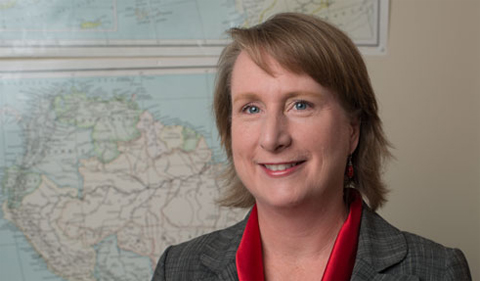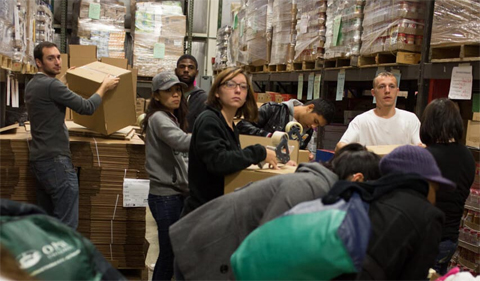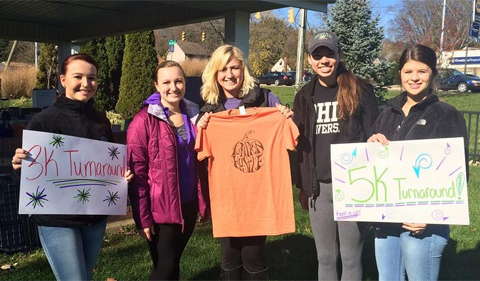by Emily Baxstrom
From Office of Instructional Innovation
One reason Dr. Julia Paxton, Professor of Economics and former director of the Center for Campus and Community Engagement, is a strong proponent of service learning is because her students experience things she can’t teach in the classroom. The relationships they build with the community complement the theories they learn about in class, leading to internal analysis.
In her economics courses, Paxton’s students are so excited and engaged that her biggest challenge is getting them to stop talking. “It’s great. it’s a good problem to have,” she said.
Her Secret? Service Learning
Paxton is a longtime champion of service learning pedagogy. When she first started teaching in 2000, she began adding service learning to her courses simply as a way to motivate her students. She noticed that some of her students brought their experiences to class discussion—whether it was working in another country or with a nonprofit, a personal experience, or an internship—and these students were more animated and engaged than other students who did not have these experiences.

Dr. Julia Paxton
She wanted to give all her students the same opportunity and experience to level the playing field. She considered the location of the Athens Campus in the poorest county in Ohio and realized that there are so many opportunities for students here.
“I thought maybe my students could go see a nonprofit working on poverty alleviation, and then they could start forming their own opinions based on their experiences and gain interest in concepts and theories I’m trying to teach them,” she said.
In a class focused on international poverty, she started incorporating more and more about structures of poverty specifically in Appalachia. “The students responded and became very interested,” said Paxton. “Service learning cuts across every single student in the class; it is an equalizer.”
Paxton has worked with around 15 different local nonprofits throughout her years at Ohio University. She currently is teaching two courses that enable OHIO students to learn ways to give back to their community: Economics of Poverty and Economics of Altruism.
Economics of Poverty Course
Paxton’s goal in her courses is to personalize the theories her students learn. In her Economics of Poverty course, she divides her students into groups for various experiences.
One group partners with Good Works, a local homeless shelter. Students in this group cook a meal once a week and eat and play cards with the people staying at the shelter. Spending time with those at the shelter allows the students to get to know people and their stories if they’re staying there for several weeks. The students do not outwardly claim they are volunteering for a class.
“We don’t want to overwhelm anyone, and we don’t want it to be the haves and have-nots,” said Paxton.

Paxton’s students in her Economics of Poverty class help pack food boxes for local pantries at the Southeast Ohio Food Bank.
This group also spends one full day doing a bigger work project for an Athens County family in need (i.e., helping with home maintenance, working on an accessible ramp, mowing someone’s grass). The family also works on the project, allowing the students to develop a more personal relationship with them.
One of the topics studied in the class is educational attainment and poverty.
Another group of Paxton’s students form the College Bound Bobcat Club, working with eighth-graders who might be first-generation college students. The eighth-graders come to the Athens Campus once per week, and Paxton’s students create an experience based on what subject or area the eighth-graders are interested in to inspire them in continuing their education after high school.
Paxton’s students tour them around campus and even introduce them to their favorite professors. A big myth among the eighth-graders tends to be that they can’t afford to go to college. Paxton’s students take them to talk to the Office of Student Financial Aid and Scholarships and Undergraduate Admissions to show them how it’s possible for them to go to college, and they give them ideas of programs to consider.
This fall, Paxton’s students will volunteer in Chauncey, a village close to Athens with a rich history and some current economic challenges. Many of these children spend time at the Chauncey Public Library after school. Paxton’s students will form “Cooks and Books” and spend time with these children in the library. They will share stories and recipes from home, teaching the children about food and games from different countries and telling stories. They and the children also will plan food and activities for the fourth Annual Chauncey Campfire.
“My students get to know these kids and start seeing the little things that bring them joy and pride as well as challenges,” said Paxton. “Their parents may be working two or three jobs or have legal, transportation, or addiction problems. It’s very interesting for a class on poverty to get that personal.”

Paxton’s students in her Economics of Altruism class helped organize the Pumpkin Hustle race to benefit Live Healthy Appalachia.
Economics of Altruism Course
Paxton also teaches an Economics of Altruism course in which her students learn about what makes people kind and generous. This course grew out of her 2011 University Professor course of the same name. Part of the course entails students designing experiments they perform across the Athens Campus, testing when people will be kind and when they won’t. “Economics is a behavioral science, so that’s really fun to watch,” said Paxton.
The class also partners with Warren and Doris Buffett’s Learning by Giving Foundation, which gives money to 30 different universities across the United States. The foundation donates $10,000 to Paxton’s class to give away to one organization. Paxton’s students select four local nonprofits from a list of 80, volunteer for one of those four organizations throughout the semester, and then make pitches at the end of the semester for why the class should donate funds to their particular organization. The students’ end decision is based off of impact analysis, relevance, sustainability, and excellence in management.
“It’s very real, and the class also becomes about effective philanthropy,” said Paxton. “If you’re going to be generous, how do you know how to do it responsibly?” Past recipients include Community Food Initiatives and Live Healthy Appalachia. (See “Paxton Economics Class Partners with Buffet Foundation on $10,000 Donation.”)
“Sometimes you can have a student who’s not your traditionally highly motivated student who just really responds to this type of learning. The lights go on,” she said. “They might take one class and want to take another one.”
Needs of Community Partners
What makes Paxton’s community relationships so beneficial is her sensitivity to the needs of her community partners.
“You have to be open-minded and build relationships,” said Paxton. She sits down with the director of each nonprofit well in advance before each semester to talk about what is feasible and what is not. “You have to be really conscientious because nonprofit leaders are stretched extremely thin.”
Paxton admitted that service learning is more work than designing a traditional course, but she emphasized that it is work that yields results. “When you really think broadly about what education really is, it’s preparing us to really go out there as educated and informed citizens of the world, and this fits into that,” she said.
The Ohio University Alumni Gateway is engraved with a quote about service:
So enter that daily thou mayest grow in knowledge wisdom and love
So depart that daily thou mayest better serve thy fellowmen thy country and thy God
“This university is founded on service and education and knowledge, so it fits in very nicely with the mandate of Ohio University,” said Paxton.
For others interested in service learning, Paxton recommends taking the workshops and training from the CCCE. The trainings cover topics including service learning as a philosophy, pedagogy and practice, criteria for service learning designated C-courses at OHIO, best practices for partnerships, and general dos and don’ts.
The Office of Instructional Innovation serves as a catalyst to spark bold experimentation and sustainable discovery of innovative instructional models that fulfill the University’s promise of a transformative educational experience. OII provides a variety of services to faculty, staff, and students in support of academic units and online programs, as well as to advance initiatives to further the institution’s mission.


















Comments